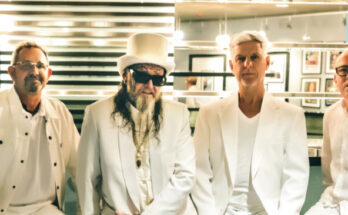The Geanies are an electrifying, 70’s influenced alt-rock power trio, releasing their debut EP, Can’t See The Sun, July 14th via Mule Kick Records. The Venice, California band is fronted by 19-year-old Sean Michael Howe. Howe has the colossal sound and technical delivery of a player well beyond his years. He’s joined on the record by Eliot Lorango on bass and Ethan Maxwell on drums, making this a band to contend with.
Howe found music at age seven while innocently listening to a band in an after-school program. He started noodling with his father’s guitars and quickly mastered the basics. Sean’s mother shared her love for chordal harmonies with him.
Can’t See the Sun genuflects to the great guitar players of post-modern music, such as Jimi Hendrix, Stevie Ray Vaughan, and B.B. King, while at the same time paying homage to the best of 90s alt-rockers such as Alice in Chains, Soundgarden, and Foo Fighters. The recording was produced by KP Hawthorn of Mule Kick Records and Steve Berns at Berns’ Fitting Room Studio in LA.
Five Questions with…
Congratulations on recording your debut EP, Can’t See The Sun, out July 14th. The first recording experience can be a mixture of excitement and terror. What was the recording experience like for you?
Thank you so much, we’re very excited that the record is finally coming out! Fortunately, this recording experience went pretty smoothly. It was a quick 3-day period but we got everything done. I’d recorded a song here & there with other bands in a couple of different studios, but this was the first time working with Steve Berns and KP Hawthorn who made the process really streamlined and enjoyable. I was nervous, of course, because there was a particular sound I was hoping to achieve and obviously I’m pretty new to this. Didn’t want to make a bunch of rookie mistakes. But Steve and KP understood where I was trying to go and I couldn’t be happier with how everything turned out. I learned a lot and it was a really positive experience, I hope to work with them again.
The sound and writing style of Geanies is a transformative throwback to some of the best 90’s rock bands, a decade just before your time. What was it about that decade of music that helped inspire and influence your sound?
I love a lot of 90s rock music, and I guess I was drawn to it more during the pandemic because a lot of those songs have a darker and deeper feel to them. It was easier to connect with at the time for those reasons, but I wouldn’t call this project a throwback to that necessarily. We have a number of other influences across the decades. I love everything from Motown to the Beatles to Hendrix to CSNY to all the 70s stuff and Stevie Ray Vaughan & Texas blues to 80s rock and into the early 90s Seattle & UK stuff — just way too much to list here. We listen to a lot of music in my house so growing up there were all kinds of eras and genres I was exposed to and influenced by. And I’m always discovering music that’s new to me, going to record stores and going through my parents’ old vinyl and CD collections.
Speaking of your sound, how has your sound matured with you throughout the years? How did the first basement/garage sound of a pre-teen Geanies transform into what we hear today?
When I was in my mid-teens I think I wrote a lot more about darker things and the music seemed to be depressing at times — I was a teenager stuck at home in a global pandemic, there was a lot to be depressed about. Luckily, I think I’ve written enough to get a lot of that out of my system. My earlier songs definitely were a little grungier and today I’m hoping for a more balanced and groovier sound. We want to continue to evolve and not be stuck in a specific category. I hope the EP reflects that evolution and the diversity in the songs’ vibes achieve a good balance.
The writing and composition process can be different for every artist. What most inspires your creative process?
It can be a lot of different things; listening to a band or album I love, hearing something new, or just simply playing acoustic guitar to myself for hours. Sometimes a song just hits me at 1 a.m. I find that even if I’m not feeling inspired to write anything, the best thing for me to do is to just sit down and play for a while, and something will turn up in that process.
If you could give the future listener of your album a personal message about what it means to you, what would that be?
This record means a lot to me for so many reasons and is a good time capsule of who I once was. That being said, this is only the beginning of what we can do and I’m really looking forward to the future. My personal hope is that the songs connect with people and make them feel good. They’re about experimenting and expanding and trying new things. That’s what we hope to continue to do going forward.


